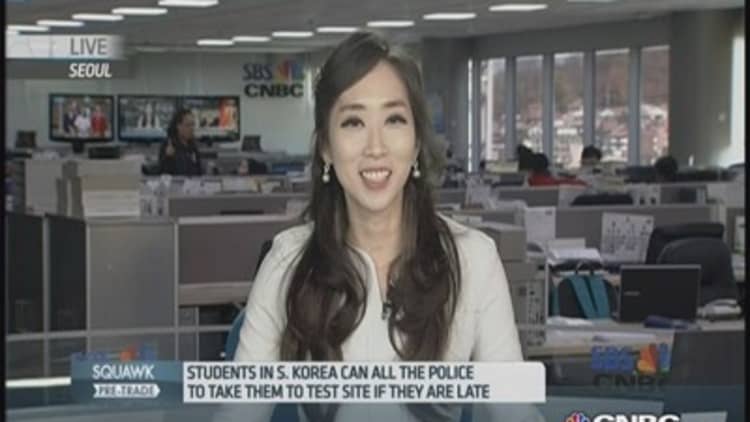
23-year old Seoyeon Oh will never forget the amount of stress she felt when taking South Korea's college entrance exam four years ago.
The annual exam is a pathway to obtaining a spot at a prestigious university and landing a job at a top-ranked corporation, or chaebol. It also shuts down most of the country: stock markets and offices open later on test day to ensure students don't get stuck in traffic, and this year saw the central bank delay its monetary policy meeting by one hour. If a student is late for the exam, they can dial the police who will escort them to the testing site. Furthermore, no airplanes are allowed to take off in Seoul during the exam's listening comprehension section to minimize noise levels.
Read MoreHow millennials areshaking North Korea's regime
"Personally, having been through the exams and then entering the work force, job searching was definitely harder in hindsight," Oh told CNBC via e-mail.
She isn't alone; youth unemployment in Asia's fourth-largest economy remains high due to a severe labor mismatch, experts say. In October, the jobless rate for people aged 15 to 29 stood at 8 percent, not far from a decade-high of 10 percent in February.
Graduates tend to avoid jobs in small-and-medium-sized enterprises (SMEs), said Wai Ho Leung, senior economist at Barclays. "Nobody wants to work for small-and-medium-sized enterprises (SMEs) because of the lower pay, only big chaebols like Hyundai and Samsung. Expectations are skewed since everybody goes to college with big dreams."
Low female participation is also a major factor. In terms of female labor market participation and wage equality between men and women, South Korea ranks at the bottom among Organization for Economic Co-operation and Development (OECD) countries, according to PricewaterhouseCoopers (PwC).
Read MoreWeak Korea exports?Don't blame the yen
'Don't go to university'
In 2011, former president Lee Myung-bak said that "the reckless entrance into college is bringing huge losses to the country," and even advised certain high-school students to skip university altogether, recommending vocational training instead.
A report from the OECD this year echoed those views, noting that apprenticeships are an effective way of improving employment opportunities for youth and reducing the overemphasis on higher education.
The government has taken notice. Youth Employment Academies were set up earlier this year to offer training courses that reflect demand at industrial sites, but progress has been low since the deadly ferry disaster in April, Barclays said.

The costs of higher education
South Korea boasts one of the highest university attendance rates among developed nations, but students are under pressure to perform well from an early age. Parents typically send children to after-school tuition sessions until late at night.
Read MoreYou probably don't get much time off if you live here…
"Korean society puts an extreme emphasis on education, and doing well on exams, which then also means pressure from schools and family," Ms. Oh said.
The country embraces the Confucian system that emphasizes a culture of respect for education, said Barclays' Leung. As a result, Koreans are the world's second biggest spenders on education, 2013 data shows.
The economic toll is severe: education-related costs, including university tuition, accounts for over a tenth of national household debt, which rose to a decade high in October.
Read MoreIs South Korea headed for Japan-style deflation?
Additionally, students' mental health is at risk. Last week, the government said South Korean children were the least happy among their peers in developed countries, citing the strain of high expectations. More worryingly, suicide is the lead cause of death for people aged 10 to 30, according to official data - the highest rate in the developed world, with academic performance cited as a key reason.
—Additional reporting by CNBC's June Yoon.

